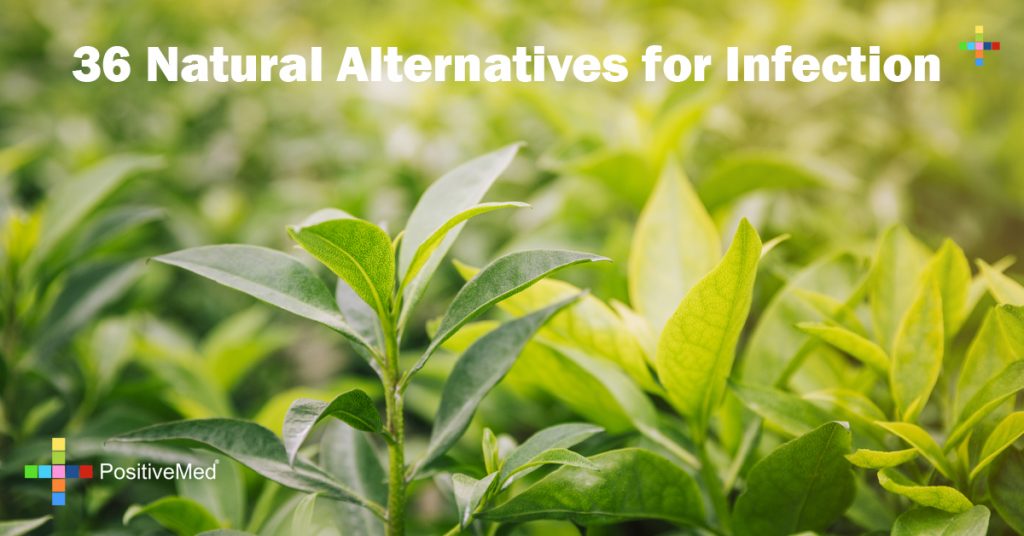
This is an amazing article, I firmly believe in the body’s ability to heal itself and to try natural remedies first. I do not believe in the exclusion of professional medical advice however, and your doctor should be kept abreast of all remedies you are trying.

Here are 36 natural substances which have been studied to help to support our body’s immune system to heal itself!
- Manuka honey fights serious infection caused by MRSA
- The inhalation of tea catechin appears to suppress MRSA infection in the elderly.
- Tea tree topical preparations are superior to standard topical regimen for the clearance of MRSA colonization.
- Garlic and tea have antibacterial activity against Klebsiella, as well as drug resistant strains of Saphylococci, Enterococci and Psedomonas aeruginosa.
- Water extract of garlic has antimicrobical activity against multidrug-resistant bacteria and Candida species, and many other microbials.
- The compound found within garlic known as allicin has antibacterial activity against methicillin-resistant Staphylococcus aureus.
- Probiotic therapy has therapeutic value in treating Klebsiella infection in children.
- Susceptibility to ear disease in children may be a result of deficiencies of zinc and vitamin A.
- Topical nanocrystalline silver dressing may provide an alternative treatment for MRSA infected wounds to oral antimicrobials.
- Cranberry may reduce the risk of urinary tract infections by inhibiting biofilms in the bladder.
- Probiotic strains from breast milk are superior to antibiotics in the treatment of infectious mastitis.
- Honey may have a therapeutic role in treating refractory chronic rhinosinusitus.
- Honeydew and manuka honey has strong antimicrobial activity against multi-drug resistant pathogens.
- Cinnamon verum bark has the highest antimicrobial activity, particularly against antibiotic resistant strains, of 13 essential oils tested.
- A number of plant oil extracts inhibit multi-resistant strains of bacteria and yeast.
- Clove, guava and lemongrass exhibit the highest synergism rate with antimicrobial drugs.
- Thyme and Eucalyptus oil have antibacterial activity against MRSA isolates.
- Compounds isolated from Bay leaf have anti-MRSA activity.
- The essential oil of dill and peppermint enhances the antimicrobial activity of nitrofurantoin against enterobacteria.
- Grape seed extract has bactericidal effects on MRSA.
- A combination of Citricidal (grapefruit seed extract) and geranium oil showed the greatest anti-bacterial effects against MRSA.
- Rosemary has activity against drug-resistant bacterial and fungal pathogens.
- Propolis exhibits antimicrobial effects on Escherichia coli and Staphylococcus aureus strains resistant to various antibiotics and some microorganisms.
- Cumin essential oil exhibits anti-Klebsiella activity.
- Green tea exhibits anti-MRSA activity.
- Mango seed kernel extract may potentially be useful as an alternative therapeutic agent or an adjunctive therapy along with penicillin G in the treatment of MRSA infections.
- Wormwood, tarragon and eucalyptus contain the compound pipertone which reduces antibiotic resistance against Enterobacter cloacae.
- Alpinia galanga contains a compound with activity against multi-drug resistant bacteria.
- Elecampane (Inula helenium) has potent antisaphylococcal activity, including against MRSA.
- Lavender oil has antimicrobial activity against methicillin-sensitive and methicillin-resistant Staphylococcus aureus.
- Lactobacillus rhamnosus GG inhibits invasion of cultured human respiratory cells by macrolide-resistant group A streptococci.
- Lime has potent antibacterial activity against multiple drug resistant E. coli.
- Nigella sativa has anti-bacterial activity against clinical isolates of methicillin resistant Staphylococcus aureus.
- Nutmeg contains a compound with potent anti-biofilm activity against oral bacteria.
- Olive leaf extract demonstrates antimicrobial activity against Campylobacter jejuni, Helicobacter pylori and Staphylococcus aureus [including meticillin-resistant S. aureus (MRSA)].
- Cinnamon and Oregano, containing cinnamaldehyde and carvacrol, respectively, exhibit powerful antimicrobial activity against antibiotic-resistant strains of Campylobacter jejuni isolates.





